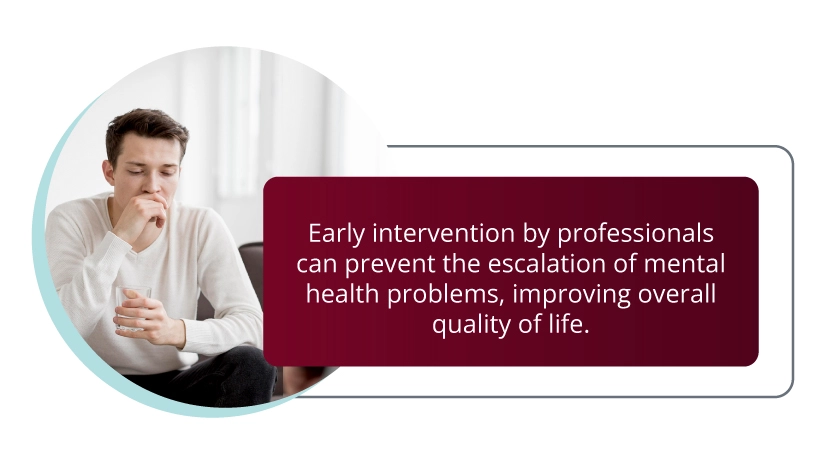
Harnessing the Power of Nature for Mental Health
Learn about the link between nature and mental health. Improve your mental health with Indiana Center for Recovery.

Many of us encounter challenges that can affect our mental and emotional well-being. Seeking professional mental health support can be empowering. In a safe and nurturing environment, compassionate therapists or counselors can help you address these issues. They provide empathetic guidance and evidence-based interventions to support your growth and healing.
Whether addressing anxiety, depression, trauma, or other conditions, therapy fosters understanding and equips individuals with coping strategies to navigate life’s complexities.
Professional support provides a safe space to address mental health challenges, improve self-awareness, and foster personal growth. Here’s what you need to know:
For more information and guidance on embracing a healthier future, contact Indiana Center for Recovery at (844) 650-0064.

Seeking professional help for mental health issues offers many benefits. Trained professionals can guide individuals toward better mental well-being and provide support through challenging times.
Mental health professionals can accurately diagnose mental health conditions. They use various tools and techniques to understand a person’s symptoms and challenges. A correct diagnosis is essential for effective treatment. It helps identify the root cause of issues, allowing for a more targeted approach to care. Without a professional diagnosis, individuals might not receive the help they need.
Once a diagnosis is made, mental health professionals create personalized treatment plans. These plans are tailored to meet the unique needs of each individual. Personalized treatment plans consider a person’s specific symptoms, lifestyle, and goals. This approach ensures that the treatment is relevant and effective. It helps individuals progress at their own pace and in the best way for them.
In some cases, medication can be an important part of treating mental health issues. Professionals can prescribe and manage medications. They monitor how the medication affects the individual and make adjustments as needed.
Proper medication management helps to ensure that individuals get the best results with minimal side effects. It also provides a sense of safety and support for those taking medication.
Mental health professionals offer access to specialized therapies that may not be available otherwise. These therapies can include cognitive-behavioral therapy (CBT), dialectical behavior therapy (DBT), and other evidence-based practices.
Specialized therapies are designed to address specific issues and can be highly effective. They provide tools and strategies to cope with and overcome mental health challenges.
Professional help is crucial during a mental health crisis. Mental health professionals provide crisis intervention and support when it is needed the most. They are trained to handle emergencies and offer immediate assistance. This support can be lifesaving and help individuals stabilize during difficult times. Knowing that help is available during a crisis can provide security and reassurance.
Mental health professionals educate individuals about their conditions and available treatments. They also provide valuable resources to help people understand and manage their mental health. Education empowers people to take an active role in their care, helping them make informed decisions and develop coping strategies.
Resources include support groups, reading materials, or online tools. Access to these resources can significantly impact a person’s journey toward mental wellness.
Seeking help for mental health issues is vital, but many barriers make it difficult. Understanding these challenges can help more people get the support they need.
Stigma and misconceptions often prevent people from seeking help. Many fear being judged or labeled “weak” or “crazy.” Some believe that mental health issues are not real problems. These false beliefs make it hard for people to reach out. We need to dialog openly about mental health to break these stigmas. Educating others can help change their minds.
Financial concerns and a lack of insurance also create obstacles. Many people worry about the cost of therapy or medication, which can be too high without insurance. Even with insurance, some plans do not cover mental health services. We must push for better insurance coverage and more affordable mental health care.
Accessibility and availability of services are a major issue. In some areas, especially rural ones, mental health services are scarce. People may have to travel far to find a therapist or psychiatrist.
Additionally, long wait times for appointments can discourage people from seeking help. Increasing the number of mental health specialists and expanding services can address these issues.
Fear and reluctance to seek help are common. People often fear being misunderstood or not taken seriously. They might also worry about confidentiality. Building trust between patients and providers is extremely important. Encouraging open, honest communication can reduce these fears.
Education and resources play a key role in overcoming these barriers. Schools, workplaces, and communities should offer information about mental health. Resources like hotlines, websites, and support groups can guide people in finding help. Educating people about the benefits of seeking help can make a big difference.
Professional intervention for mental health can have profound and long-lasting impacts on individuals, families, and communities.
Engaging with professional mental health services dramatically enhances one’s quality of life. People often experience better moods, increased energy, and a renewed sense of purpose.
Engaging in daily activities, pursuing hobbies, and setting goals are easier for them. As mental health improves, individuals often notice a positive change in their physical health, highlighting the strong mind-body connection.
Therapists equip individuals with essential tools to handle stress and adversity. Through various therapeutic techniques, individuals learn to identify triggers and develop healthy coping strategies.
These skills foster resilience, enabling individuals to navigate life’s challenges more effectively. Over time, they become more adept at managing difficult situations, reducing the impact of stress on their mental health.
Professional intervention plays a crucial role in preventing relapse. Regular therapy sessions help individuals stay mindful of their mental health and recognize early signs of distress. Therapists provide ongoing support and adjustments to treatment plans, which help in maintaining mental well-being. Professional intervention reduces the likelihood of recurring episodes by addressing issues before they escalate.
Improved mental health positively affects relationships and social interactions. Therapy often includes learning communication skills, which strengthen personal and professional relationships.
Individuals become more empathetic, patient, and understanding, fostering deeper connections with others. As social connections strengthen, individuals find a supportive network, enhancing overall well-being and reducing feelings of isolation.
Mental health experts play a key role in supporting individuals with mental health issues. Each type of professional has specific skills and training to help people in different ways.
Psychiatrists are medical doctors who specialize in mental health. They can identify mental health conditions, prescribe medications, and provide therapy. They often treat severe mental health disorders like schizophrenia, bipolar disorder, and major depression. Their medical training also allows them to consider the impact of physical health on mental well-being.
Psychologists focus on understanding thoughts, emotions, and behaviors. They use numerous forms of therapy, such as cognitive-behavioral therapy (CBT), to help people manage their mental health issues. Unlike psychiatrists, they do not prescribe medications. They often work with individuals to understand the root causes of their issues and build coping strategies.
Counselors and therapists provide support for people dealing with a wide range of mental health issues. They offer a safe space to talk about feelings and experiences. They use talk therapy to help individuals cope with stress, depression, anxiety, and other emotional problems. They also help people develop better communication and relationship skills.
Social workers and case managers connect people with resources and services. They often help with practical issues like housing, employment, and access to healthcare. They support individuals and families in navigating the mental health system and advocating for their needs. They play a critical role in ensuring people get the help they need.
Occupational therapists support people to improve their ability to perform daily activities. They work with individuals with mental health conditions to develop skills for living independently. These can include managing time, organizing tasks, and improving social interactions. By promoting independence and well-being, occupational therapists aim to enhance quality of life.
Alternative and supplementary support systems refer to additional resources or networks that individuals can access beyond traditional or primary support systems like family, friends, or formal institutions.
Support groups and peer support offer a safe place for people with mental health issues to share their experiences. In these groups, members talk about their feelings and challenges, listen to each other, and encourage each other. Peer support can be very helpful because it comes from people who understand what you’re going through.
These groups can meet in person or online, making it easy for anyone to join. Knowing that others face similar struggles can make you feel less alone and more hopeful.
Online therapy and telehealth services have become popular ways to get help for mental health issues. You can talk to a therapist from the comfort of your home using a computer or phone. This is especially useful for people who live far from a therapist’s office or have busy schedules.
Online therapy can be as effective as in-person therapy. It offers various options, like video calls, chats, or even text messages. Telehealth services provide flexibility and privacy, making it easier for more people to seek help.
Holistic approaches and lifestyle changes can improve mental health in many ways. This means looking at the whole person, not just the symptoms. Exercise, healthy food, and good sleep are key parts of this approach. Yoga, meditation, and deep breathing can reduce stress and boost mood. Spending time in nature and practicing mindfulness can also help.
Small changes in daily habits can lead to big improvements in mental well-being. These methods work best when combined with other forms of support, like therapy or medication.
Supporting someone with mental health issues is important because it validates their experiences, reduces isolation, and encourages seeking professional help. It fosters a sense of belonging and reassures them they are not alone in their struggles.
Moreover, support promotes recovery by offering practical assistance and empathy, which is essential for managing symptoms and improving overall well-being. By understanding and supporting individuals with mental health challenges, we contribute to a more compassionate and inclusive society.
Seeking help for mental illness is crucial because professional intervention provides effective treatments and support tailored to individual needs. Therapists and psychiatrists can offer strategies to manage symptoms, improve quality of life, and prevent worsening conditions.
Additionally, seeking help reduces isolation, promotes understanding of one’s mental health, and encourages healthy coping mechanisms. Early intervention can also prevent long-term complications, making it essential to address mental health concerns promptly and effectively.
Seeking professional help for mental health issues offers specialized expertise and guidance tailored to individual needs. Therapists and psychiatrists provide evidence-based treatments, such as therapy and medications, that effectively manage symptoms and promote recovery.
Professional support fosters a safe environment to explore and understand emotions, thoughts, and behaviors, improving self-awareness and coping skills. Additionally, seeking help reduces stigma, enhances social support, and empowers individuals to participate actively in their mental health journey toward overall well-being.
At Indiana Center for Recovery, we understand the complexities of mental health and offer comprehensive support to empower your journey to wellness. Our inclusive services include personalized inpatient and outpatient care to guide you toward lasting wellness.
Furthermore, our tailored treatment plans combine therapy, medication, and alternative modalities, ensuring holistic healing for your mind and body.
Don’t wait to get the help you deserve. Contact us at (844) 650-0064 today and take the first step towards a healthier future.